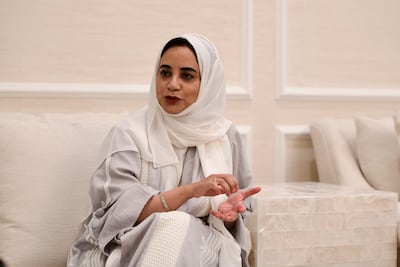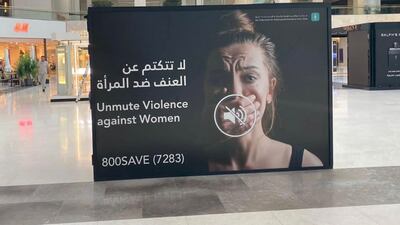As a global campaign by the UN to end violence against women begins, a victim of domestic abuse in the UAE has shared her story of the struggle to escape her abusive partner.
“I want other women, who are suffering in silence, to know that there is a way out. There are people out there to support if you seek help,” Deepika, a mother of two from Tamil Nadu, India, told The National.
An engineering graduate, Deepika — whose name we have changed — was in her early 30s when she came to Dubai after getting married to the love of her life.
But soon the marriage turned sour and her husband, also an engineer, started abusing her mentally and physically.
“Everything was going smoothly until he got involved with a female colleague and wanted to divorce me. When I refused, he started harassing me. I did not have anyone here to fall back upon. Me and my two kids, then aged 11 and 4, were financially dependent on him as he did not allow me to work,” said Deepika.
The abuse worsened and he cancelled her residence visa, stopped paying rent and even disconnected the utilities.
“I was desperate for help. We did not even have enough food in the house. I approached the Indian consulate and to my surprise I got both legal and moral support. They assigned me a social worker, who brought me food and treated me like a family member.”
Although she received a favourable court verdict that ordered her husband to pay her maintenance, he left the UAE for India, with plans to migrate to Canada.
“I filed a police case in India with the help of the consulate and got his passport impounded," she said.
Three years later, their divorce is still in the courts and Deepika is fighting for alimony and other rights.
"When I look back, I am happy that I got out. I am grateful to many people that I could come out of the abusive marriage and start a new life,” said Deepika, who is currently working in India.
Cycle of violence
Deepika’s is one of the rare success stories of a woman who had the courage to speak up, seek help, and finally break free from domestic abuse.
A majority of victims get trapped in a cycle of abuse and suffer in silence due to societal and family pressure or for lack of community or legal support.
Data published by UN Women shows that at least one in three women experience gender-based violence during their lifetime, and more than five women or girls are killed every hour by someone in their own family.
The World Health Organisation estimates that 37 per cent of women in its Eastern Mediterranean region, which covers the Middle East, have experienced physical and/or sexual violence from an intimate partner.
Other forms of violence prevail in the region include ‘honour’-related killing, early, forced and temporary marriages, sexual harassment in public spaces and harmful practices such as female genital mutilation.
In a report, Amnesty International pointed out that gender-based violence was already a pervasive human rights concern in the Middle East and there has been a surge in domestic violence during the Covid-19 lockdowns.
Spotlight on gender violence

UN Women’s ‘16 Days of Activism against Gender-Based Violence’ that started on November 25, aims to put spotlight on the issue and promote concerted efforts to help eliminate violence against women.
In the UAE, many government buildings were lit up in orange to support the campaign.
Dr Mouza Al Shehhi, Director, UN Women Liaison Office for the GCC, told The National that though the campaign is more than 30 years old, its relevance is still strikingly urgent.
“Although we had hoped that there was a lesser need for it today, the reality is different," she said.
“Violence against women is extremely prevalent globally. Home is not a safe place for many women and girls."
While the true extent of the problem remains unreported, Dr Al Shehhi spoke of the need to break the "stigma" around gender-based violence.
“Services for women and girls experiencing violence can be the difference between life and death," she said.
"This means that shelters, hotlines, counselling and all support for survivors of gender-based violence need to be available for those in need, even during crises and emergencies.
More platforms for women to seek help
Social workers say more women are coming forward to seek legal recourse to escape abusive environments. Amended laws ensuring protection for women from abuse and discrimination are also a shot in the arm. For instance, in March 2020 a new domestic violence law came into effect that enabled women to obtain restraining orders against abusers.
The hotlines offered by organisations such as the Dubai Foundation for Women and Children and the Abu Dhabi Centre for Sheltering and Humanitarian Care – Ewaa and community wings in various embassies, they said, have provided a huge support system for victims.
“There has been a marked difference when it comes to different avenues available for women to seek help," Jyothi Kapoor, a social worker, who has worked closely with several cases of gender abuse, told The National. "Having said that, there is much more to be done.”
Ms Kapoor said campaigns to end violence against women should have more visibility, with help easily accessible for victims.
She said: “We need to create awareness about what constitutes abuse and encourage women to come out and seek help.”


